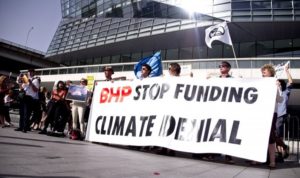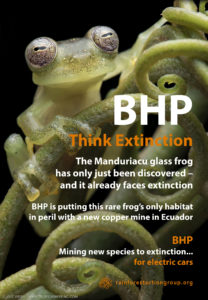
BHP held their 2019 AGM in Sydney on November 7. A small, peaceful protest was held outside by climate groups wanting to draw public focus to the debate around BHP leaving the Minerals Council. Two Rainforest Action Group members flew to Sydney from Hobart and Melbourne to ask questions as proxy shareholders.
The Rainforest Action Group’s first questioner asked:
“My questions concern social and political risks when operating in Ecuador, and our company’s due diligence and transparency to shareholders when managing these risks. In particular I am concerned about our company’s activities in the Santa Teresa 1 and 2 concessions in Imbabura, and in the Luminex/BHP concession in Tarquí, Morona Santiago. Given BHP’s significant investments in these areas, and given BHP’s strong goals and values around social and environmental conduct that the Chairman highlighted in his report, I would like to highlight that:
- Both regions feature strong anti-mining sentiments, with communities mobilising against mining due to concerns about water, environmental damage, and lack of adequate consultation or consent to the selling of their lands.
- There have been recent complaints against BHP’s conduct in the community of Puranquí, in Santa Teresa 2, involving lack of adequate consultation in the obtaining of exploration and water permits that were acquired two weeks ago. The main complaint was that meetings were held only with a pro mining minority of the community, ie two families, and excluded the Council and Mayor, who were against mining.
- The Tarquí concession is close to the controversial Mirador project in Shuar territory, where there has historically been significant unrest. Social and political risk factors for BHP include civil dissent, weak government laws regarding community consultation, a history of human rights abuses in the area due to mining, and the use of military forces to suppress peaceful protests. We have testimonies from this area which I don’t have time to read out, saying that BHP has been operating in this area for over a year with little or no community consultation.
- Ecuador is classified by the IMF as ‘high investment risk’ due to political instability, popular resistance against extractive industries, and recent history of uprisings.
- My first question is: Given the company’s significant stakes in Ecuador, and the issues outlined above, how does our company plan to use due diligence when working with people who don’t want mining, who feel that their land has been sold from under them, and who have limited recourse to exercise their civil rights within Ecuador under current laws without risk of violent retaliation?
- My second question is: Given BHP’s company values, how will the company maintain transparency to shareholders in situations where there is evidence of civil or political conflict or environmental damage directly or indirectly caused by mining activities?”
The Chairman’s reply (roughly) was this:
“For the benefit of shareholders let me give you an overview of the Ecuador situation. We are in very early stages of exploration here; we’ve done very little in these areas. We’re going in slowly and we are aware of the sensitivities. We are only doing very low impact activities in these areas. We are talking to communities and can assure you that we are following FPIC (free, prior and informed consent) and all local laws; we have strict standards for consultation and our conduct when entering new areas. So there is not a lot we can say in answer to this question."
The Rainforest Action Group’s second questioner spoke about BHP’s relationship with SolGold and the dangers and risks of the Cascabel project, including Colombian paramilitary activities, illegal miners and crime in the area. The questioner read from a summary which took about 3-4 minutes to read. The gist of the summary can be found here. Halfway through the presentation, the Chairman started to interject, before finally turning off the questioner’s microphone.

The Chairman’s reply was as follows:
“I don’t know where these details came from and I am not familiar with most of the issues mentioned. Again, as before, for the benefit of shareholders let me explain what the situation is in Ecuador. We are in very early greenfields stages of exploration here, we’re doing very low impact activities, and we can assure you we are doing sovereign risk analyses around Ecuador as well, and of course, you know, we will continue to monitor that situation. Our shareholding in SolGold is quite small, it’s around 11% of the company, we have a ‘watching brief’ over that. So it’s very early days, and we have due processes in place about all that. What we won’t compromise on is following the law, complying with local regulations and applying our global standards which are well articulated, for example in the ICNN, in terms of how we’d like to survey … and we may very well decide that this is not a place where we want to participate.”
The Board were clearly rattled by some of the more pointed questions from shareholders. Someone who spoke about lung diseases from iron ore micro dust from inhalation in Port Hedland lost his microphone as well, as did someone from the Australasian Corporate Accountability Network who was part of the shareholders’ group that had put forward the motion for BHP to exit the Minerals Council. A Colombian human rights defender raised concerns about Cerrejón and was addressed by the CEO, who said that BHP only owns about 33% share in the mine and therefore is only able to monitor impacts of operations from within a limited jurisdiction. In other words, BHP couldn’t be held to account for the complaints the questioner was bringing forth.
Samarco was mentioned by a shareholder, who commended the Board on how well BHP has handled the situation. The CEO said that the AGM of 2015 was 'emotional', people were 'very cross', and BHP was moved to ensure it was accountable and take the necessary remedial steps. He said he felt BHP had done ‘very well.’ Four questioners raised climate change issues. Two trade unionists also asked questions.
A Chilean asked questions regarding the recent troubles in Chile, particularly in regarding to BHP workers from Escondida mine striking in solidarity with the protesters, and reports of under-remuneration and poor conditions for BHP workers and contractors at Escondida. The questioner also eluded to issues regarding the status of BHP assets in Chile, if the Government fell. BHP’s CEO responded that he was receiving daily reports and in communication with people on the ground in Chile, and was aware of everything the questioner was saying. He said:
“I’ll stick my neck out and say that (the workers) are probably better remunerated and have better conditions than the average Chilean. But … within our contractor community there may be some that feel less advantaged, and we’re conscious of that, and we’ll work through that; we understand the pressure of change.”
The CEO said he had not been aware of the threat of renationalisation of copper, but that he’s focused on raising revenue and reducing Chile’s debt, which he said would pay for better healthcare and education, and possibly increase wages in the long run. He finished by reiterating that Escondida, Spence and other mines in Chile are ‘some of the best in the world’ and that BHP is committed to running a productive and well-remunerated workforce.
A member of the Australian Conservation Foundation, also asked the Board about concerns about radioactive tailings at Roxby Downs in South Australia, particularly in light of impacts on birds and the local environment.
Two Board members came and spoke to RAG’s two proxies at lunch. Chief geophysicist Laura Tyler said she felt that the Chairman hadn't answered their questions, and that she was here to talk but further and give them some reassurances about their concerns. She made some elucidating comments. The first was (roughly):
“We have a policy manual with rules for entering new countries, which we follow carefully. We try to gain as much information as possible about the political situation and about environments in the areas before we start working.”
RAG’s representatives said that with regard to environments at risk from operations, Ecuador was a completely different situation to the desert regions that BHP is mining in Chile, due to the cover of biodiverse rainforests etc. Ms Tyler agreed.
Carolyn Cox, BHP’s Secretary also spoke with the two representatives and gave the contact for the chief of operations in the Americas, suggesting that they write him an email expressing concerns about Ecuador. She agreed that it is important BHP receives feedback from communities on the ground, as they can't keep track of everything otherwise. The representatives mentioned the Manduriacu Glass Frog, a critically endangered species which is thought to now be extinct due to BHP’s preliminary exploration activities in its only habitat. Ms Cox said she hadn’t known about this and appeared to be very surprised as BHP’s environmental goals clearly state they will not conduct operations in any area where there is known to be an IUCN Red List species. She agreed that this concern is worth pursuing further.
Below are links to some media coverage of the AGM, including the decision by BHP shareholders to stay in industry lobby groups: